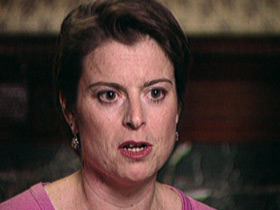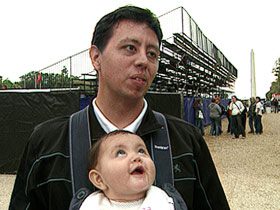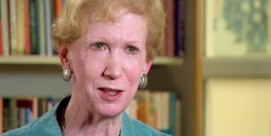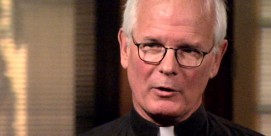In This Episode << SLIDE LEFT TO SEE ADDITIONAL SEGMENTS
Faith and Family in America Survey Discussion
BOB ABERNETHY, anchor: We begin today a special series on Faith and Family in America (Read more about the R&E survey).
The numbers on how family structures have changed are dramatic. Counting parents with children at home, as recently as 1970, traditional families — mother and father with children under 18 — made up 40 percent of all households. But by 2000, that had fallen to just a quarter of all households.
Nontraditional families — single, divorced, or cohabiting parents with children — were 16 percent. The rest are households without children.
We wondered what such changes have meant to religion, so we commissioned a poll and announced the results this week. John Green of the University of Akron helped design the survey and interpret the findings. Anna Greenberg of Greenberg Quinlan Rosner Research conducted it.

ANNA GREENBERG (Vice President, Greenberg Quinlan Rosner Research Inc.): I think one of the most important things we found in this survey was a gap between belief and reality. Overall, if you look at this study, the vast majority think that God has said there should be a marriage between a man and a woman for life. A vast majority believe that kids should be raised by parents who are married. But then when you look at issues of divorce, cohabitation, what you see is a majority of people thinking divorce is an acceptable resolution to marital conflict; almost a majority saying cohabitation is perfectly acceptable — and I think it is a recognition that in reality, that most people can’t quite live up to that ideal.
ABERNETHY: And John, what are the effects of this among the nontraditional folks, the effects regarding religion?
Professor JOHN GREEN (Director, Ray C. Bliss Institute of Applied Politics, University of Akron and Senior Fellow, Pew Forum on Religion & Public Life): Well, probably the major effect is that nontraditional families are less likely to attend traditional worship services and therefore [less] likely to be active in the lives of local congregations, and that has an effect — not only on their own lives, because they don’t have available the resources of local congregations, but it also impoverishes the congregations themselves, because there’s a whole set of people that are not present in those churches. And we do find that some of the more conservative congregations, evangelicals and others that preach a very conservative and traditional view of family, are ironically much more open to people who are in nontraditional families, having ministries for singles and for divorced people. And this creates perhaps a little bit of a problem for someone in a nontraditional family that might find a church most welcoming personally that actually holds a different set of values than fits in their life.
ABERNETHY: And what surprised you about the findings?
Ms. GREENBERG: Well, I’m surprised at the level of tolerance among religious conservatives around a whole range of issues related to marriage and family. If you look at religiously conservative people, mainly evangelicals, traditional Catholics, they have very traditional notions about what a family should look like, and yet they have some fairly tolerant attitudes. For instance, only about a third of them say divorce is a sin. You also see, I think, a broad acceptance for gay adoption, you know, the notion that gays can be part of a family.

ABERNETHY: And John, what came as a surprise to you?
Prof. GREEN: Well, a couple of things. One is this: the greater tolerance and acceptance of even conservative religious people of deviations from the ideal of marriage was pretty surprising to me. But also the fact that many people who are not in traditional religion or in traditional families nonetheless have very vibrant spiritual lives. They pray; they have family devotions; religion is important to them.
ABERNETHY: And John, moral values — that was asked, and what did you find?
Prof. GREEN: Well, it’s interesting. You know, after the 2004 election Americans woke up to discover that the single largest priority among voters, about one fifth of the people who voted in 2004, was moral values. Well, we asked the same question in this survey and found, again, roughly a fifth of Americans thought that moral values were very important. But then we asked them what they meant by “moral values,” and the findings are really quite interesting. Only about 10 percent of people think about marriage or abortion when they think about moral values, and the largest single group thinks about matters of personal integrity, such as honesty, personal responsibility.
ABERNETHY: And on the question of whether the government should encourage marriage?
Ms. GREENBERG: People think of marriage and family as private issues. We asked people, “Do you think that government should be involved in supporting marriage initiatives, to encourage people to get married?” And, in fact, the vast majority — 80 percent – say, “No, in fact, they should stay out of it.” And that holds true across a range of different faith traditions. So even the people who hold very, very traditional notions about family oppose government getting involved in those efforts.

ABERNETHY: And, Anna, there were some interesting findings about sex education?
Ms. GREENBERG: That’s right. Our survey found that a majority of Americans support comprehensive sex education, which means teaching about abstinence, but also teaching about birth control and sexually transmitted diseases. Only a minority support only teaching abstinence. And that holds across the board. So if you were to look at religious conservatives or religious liberals, across the board they support comprehensive sex education.
ABERNETHY: Anna Greenberg, John Green — many thanks.
Prof. GREEN: You’re welcome.
Ms. GREENBERG: Thank you.
ABERNETHY: Another scholar who analyzed our survey and others was Brad Wilcox of the University of Virginia. He spoke of religion and married men.

Professor W. BRADFORD WILCOX (Department of Sociology, University of Virginia and Resident Fellow, Institute for American Values): What we find in our research is that religious married men are happier in their marriages than less religious men. So something about religion — it seems to, once again, [it] domesticates men and orients them towards their marriages.
ABERNETHY: Earlier, Wilcox commented on the findings of many surveys that the growth of nontraditional families helps explain the decline in attendance at many churches.
Prof. WILCOX: When I looked at the link between the decline in attendance over the last 30 years and family structure, or family trends, what I found is that about a third of the decline in attendance is associated with the changes we have been talking about in the American family. If we had the same number of adults who are married with kids as we did in 1972, we would see a lot more folks in the pews on Sunday.
ABERNETHY: One other thing we have learned — it’s not easy to define a family anymore. Ask for a definition [and] you get a lot of answers.
UNIDENTIFIED YOUNG BOY: A family is a group of people that love and care for you, and they give you the things that you need to live.
UNIDENTIFIED MAN #1: Father, mother, brothers, sisters, grandparents, grandchildren…
UNIDENTIFIED TEENAGE GIRL #1: Anybody that means something to me…

UNIDENTIFIED TEENAGE BOY: A close-knit group of people that always looks out for you…
UNIDENTIFIED MAN #2: Someone that you can turn to in the worst of times and in the best of times…
UNIDENTIFIED TEENAGE GIRL #2: It’s a sense of community, I think, also…
UNIDENTIFIED WOMAN #1: You can adopt extended families, neighbors, very close friends, people that care for each other…
UNIDENTIFIED WOMAN #2: that you feel connected to in any way…
UNIDENTIFIED TEENAGE GIRL #3: Family can just be like anybody that really loves you and cares about you that you spend time with…
UNIDENTIFIED MAN #3: I’m a gay man, and I have lived with my partner for 22 years and we are family…
UNIDENTIFIED MAN #4: Ideally, it means two parents and children but, in my case, it means one parent and children.

UNIDENTIFIED MAN #5: Family means being together as one — having a future with God…
UNIDENTIFIED MAN #6: We’re all brothers and sisters as it relates to God because Jesus died for us…
UNIDENTIFIED WOMAN #3: To God, marriage is more important than anything, because God instituted marriage before He did the church.
UNIDENTIFIED WOMAN #4: Family is your roots. Family is everything.
UNIDENTIFIED GIRL: It’s just something special. It’s hard to put into words, but it’s really special when you have it.
Next week, more survey results and the first of four special reports on Faith and Family in America.







